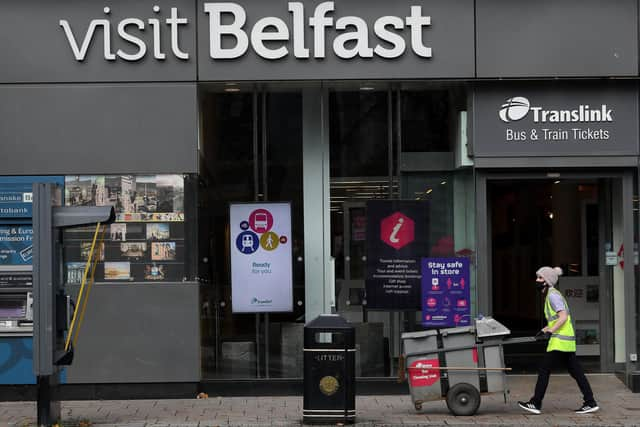The results are in - NI Covid-19 opinion survey results - 8% unlikely to wear face-coverings and 28% feel unsafe outside their home
and live on Freeview channel 276
These results are based on 3,405 interviews with members of the public carried out in the period April 21 to September 17, 2020.
Concerns about Coronavirus (COVID-19):
Just over seven out of ten people (71%) said that they were very worried or somewhat worried about the effect the Coronavirus (COVID-19) was having on their lives.
Advertisement
Hide AdAdvertisement
Hide Ad

However, these levels of worry appear to be decreasing over time. In April and May, more than three quarters of people interviewed (76% and 77% respectively) said that they were worried about the effect the Coronavirus (COVID-19) was having on their lives. This was significantly higher than the period from June onwards, when this proportion decreased and was in the range 68%-69%.
Home Schooling:
Over half of those who had home-schooled their children (54%) agreed home schooling was negatively affecting the well-being of the child/children in their household, but almost a third (31%) strongly or somewhat disagreed.
Almost three quarters (74%) strongly or somewhat agreed that they had access to the resources they needed to help them home school their child/children well, whilst just over one in five (21%) somewhat or strongly disagreed.
Financial Concerns:
Before the Coronavirus (COVID-19) outbreak, three quarters of people (75%) thought it was easy to pay their usual household bills. Just over one in five people (22%) reported it was neither easy nor difficult, whilst 3% thought it was difficult.
Advertisement
Hide AdAdvertisement
Hide AdSince the Coronavirus (COVID-19) outbreak, perceptions around paying usual household bills have changed, with fewer people (63%) reporting it was easy to pay their usual household bills and more people (14%) stating it was difficult to do so.
Almost two thirds of people (63%) thought they would be able to save any money in the next twelve months, whilst over a third of people (37%) thought they could not.
Over one in ten people (13%) interviewed from July onwards, said they had borrowed more money or used more credit cards than usual since the Coronavirus (COVID-19) outbreak, whilst the majority of people (87%) had not.
Social Distancing:
The vast majority of people (93%) reported, staying always or often, at least two metres away from other people when outside their home.
Personal Wellbeing:
Advertisement
Hide AdAdvertisement
Hide AdThe average (mean) wellbeing rating of people interviewed in the period April-September 2020 for ‘life satisfaction’ (7.63) was significantly lower (in a statistical sense) than that reported by NISRA for the 2018/19 year (7.89).
The average (mean) wellbeing rating of people interviewed in the same period for ‘anxiety’ (3.20) was significantly higher (in a statistical sense) than that reported by NISRA for 2018/19 (2.83).
However, as we move through the pandemic period, ‘life satisfaction’ ratings appear to be increasing and ‘anxiety’ levels are decreasing.
The average (mean) wellbeing ratings in August 2020 for ‘life satisfaction’ (7.79) was significantly higher (in a statistical sense) than that reported during the lockdown period in May 2020 (7.42).
Advertisement
Hide AdAdvertisement
Hide AdThe average (mean) wellbeing rating for ‘anxiety’ was significantly higher (in a statistical sense) during the lockdown period in May 2020 (3.51) than when the restrictions eased in August 2020 (3.01).
Community Support and Safety:
The vast majority of people (97%) reported feeling safe in their home since the Coronavirus (COVID-19) outbreak.
Almost half of people (48%) said they felt safe outside their home since the Coronavirus (COVID-19) outbreak, but more than one quarter (28%) reported they felt unsafe.
Following the easing of lockdown, people interviewed in August (19%) were twice as likely to think that anti-social behaviour had gone up a lot or a little compared to people interviewed in April (8%) and May (9%).
Lifestyle:
Advertisement
Hide AdAdvertisement
Hide AdApproximately, half of people (52%) thought that some aspect of their lifestyle had changed for the better since the Coronavirus (COVID-19) outbreak, whilst just under half (48%) did not.
Approximately, six in ten of these people said they were keeping in touch more with family and friends (62%), spending more quality time with the people they live with (62%) or they had a slower pace of life (59%).
Information and Advice:
Practically all people (95%) felt they had received enough information on how to protect themselves from Coronavirus (COVID-19).
Over half of people (56%) said that they had enough information about Government plans for the easing of restrictions due to the Coronavirus (COVID-19) outbreak, whilst just over two-fifths (44%) felt they did not.
Advertisement
Hide AdAdvertisement
Hide AdTwo thirds of people (66%) supported the easing of stay-at-home measures put in place in Northern Ireland, but almost one in five people (19%) did not.
Face Coverings:
The results show that the wearing of face coverings outside of homes increased significantly over the pandemic period. Over a quarter of people (28%) interviewed in June, said they had used a face covering outside their home to help slow the spread of the Coronavirus (COVID-19). This proportion increased to 84% during the month of August 2020.
The proportion of people who reported that, they would be unlikely to wear a face covering when outside their home, has decreased significantly over the pandemic period from 44% in June to 8% in August.
Comment Guidelines
National World encourages reader discussion on our stories. User feedback, insights and back-and-forth exchanges add a rich layer of context to reporting. Please review our Community Guidelines before commenting.
